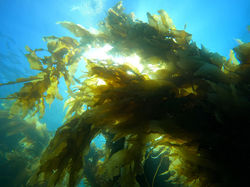
The reef needs our help.


The undeniable importance
of the coral reef
-
Corals cover less than 1% of the ocean’s floors, but fisheries depend on the reefs for 25-40% of the catch globally.
-
Coral reefs are essential for fish to breed, feed, grow, and live.
-
700 million people depend on these reef fish for their substinance

Expectation: What the reef should look like - Vibrant, colorful, plenty of healthy and happy fish inhabiting it
Reality: faded colors, minimal aquatic life, dull and deserted.
So, what's the threat?
There are countless factors that contribute to the current state of the coral reef:
-
industrial runoff
-
chemicals in sunscreen (benzene)
-
littering
-
uneducated divers
... and that is just to name a few.
But the main threat that is growing exponentially, on track to completely annihilate the reef, is the lionfish.

The venomous Lionfish has no natural predators, meaning they can reproduce exponentially.
They prey upon any fish they can catch - including native reef fish. Without interference, they will decimate the entire population of reef fish.
Capable of reproducing throughout the year, the largest lionfish can produce up to 42,000 eggs as frequently as once every 3 days.
Fertilized egg masses float to the surface where they hatch and disperse via surface ocean currents.
A female lionfish releases up to two million eggs each year and has an average lifespan of 15 years.
.png)
.png)

Eat a lion(fish)
Safety First
This is where we display information about our COVID-19 safety precautions, as well as details about upcoming dives, beach clean-ups and other Planetary Hero Events.
We are constantly updating our safety measures to reflect the newest recommendations and information provided by the WHO and the CDC.
Updated COVID-19 Safety Measures:
-
Ensure staff and attendees wear masks correctly and consistently.
-
Encourage physical distancing.
-
Encourage staff and attendees to cover coughs and sneezes and wash hands.
-
Encourage staff and attendees to stay home if they are sick or have any symptoms of COVID-19, and to get tested for COVID-19.
-
Tell staff and attendees who are not fully vaccinated and have been in close contact with someone with a confirmed case of COVID-19 to quarantine and get tested for COVID-19.
-
Conduct contact tracing, in combination with isolation and quarantine for staff or attendees who show symptoms of COVID-19. These steps are taken in a manner consistent with applicable laws and regulations, including those relating to privacy, and in collaboration with state, tribal, local, and territorial health departments.
Our Latest Dive:
Location: Catalina
 |  |  |
|---|---|---|
 |  |  |
 |


.png)